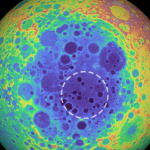Key Takeaways:
- The Hitomi satellite, launched by Japan to study black holes, made a significant discovery just before it was lost.
- Hitomi’s last observations of the Perseus Cluster, a galaxy cluster with a supermassive black hole, showed surprisingly low activity in its center.
- The data suggests that black holes play a crucial role in controlling the growth rate of galaxies by efficiently absorbing energy from their surroundings.
- Hitomi’s loss is a significant setback in understanding the universe, as it held the potential to transform our knowledge about hot gas velocities.
- Despite the loss, scientists remain hopeful about sending another microcalorimeter into space for further discoveries.
Japan launched a groundbreaking satellite called Hitomi, with the mission of monitoring black holes and unlocking the mysteries of the universe. However, the satellite’s promising journey took a tragic turn when it went out of control shortly after its launch. A combination of human errors and software flaws led to this unfortunate event, causing Hitomi to spin uncontrollably and scatter debris into space. Despite efforts to regain control, the Japan Aerospace Exploration Agency (JAXA) eventually declared the $273 million satellite irrecoverable.
![Doomed Spacecraft Shows Tantalizing Hints of Surprising Black Hole Behavior [Video]](https://static.scientificamerican.com/sciam/cache/file/3DE86E55-2301-46A9-955EFB307E6EE8F0_source.jpg?w=590&h=800&175FB4BD-6606-4F8B-9A915480EAF8F18D)
Scientists expected to observe significant activity in the center of the Perseus Cluster due to the presence of the central galaxy’s supermassive black hole. However, Hitomi’s data showed a remarkable calmness in the intracluster gas. According to co-author Andrew Fabian of Cambridge University, “The intracluster gas is quieter than expected, given the activity of the central galaxy.”
This unexpected finding carries profound implications for our understanding of how black holes influence galaxy formation. Co-author Brian McNamara of the University of Waterloo explained that the energy emitted by the black hole appears to be efficiently absorbed by the surrounding hot gas. This hot gas, essential for the formation of galaxies, exists in greater abundance than stars within galaxies. In essence, nearby black holes play a pivotal role in determining a galaxy’s eventual size, controlling its growth rate.
However, this discovery underscores how much we still don’t know about the role of black holes in galaxy formation. Hitomi’s loss was particularly disheartening because it marked the culmination of efforts to send an x-ray microcalorimeter into space—a device crucial for precise energy measurements in x-rays. The data from Hitomi’s microcalorimeter was limited, but it demonstrated the immense potential for transforming our understanding of the universe.
Before Hitomi, two previous attempts to send a microcalorimeter into space ended in accidents. One mission exploded upon launch in 2000, while the other, launched in 2005, suffered a coolant leak. Hitomi’s launch in 2016 was a milestone, as it was the first successful deployment of a microcalorimeter in space. Yet, tragically, the satellite was lost shortly afterward.
Despite this setback, scientists remain hopeful. They see the potential for future missions to carry a microcalorimeter into space, providing more opportunities for groundbreaking discoveries. As McNamara expressed, “There’s loss, but there’s also hope; we never give up. We’re hoping we can still get one there.”


